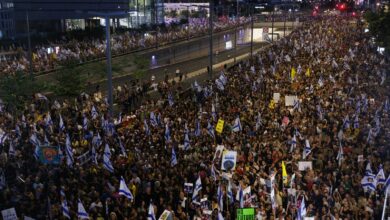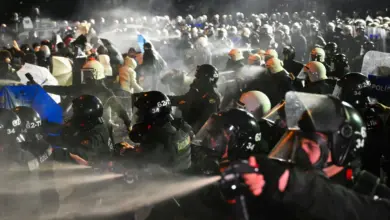“Down with Hosni Mubarak!”, “Down with the National Democratic Party”, “Enough” were the slogans clamored by the opposition on the street ahead and during the 2005 parliamentary elections. The demonstrations marked the inception of a resilient political dissent that broke conventional political taboos. And although those who spearheaded the demonstrations failed to mobilize significant numbers, the street mobility represented rising political and social discontent in Egypt.
As Egypt is approaching a new highly significant parliamentary race next month, the 2005 political mobility continues to wane. Analysts are divided on whether the weakened vocal dissent is because Egyptians are focused more on deteriorating economic matters and other less political concerns.
“In 2005, we had more political demonstrations and at some points the number of protesters was over 1000,” said Khaled Ali, director of the Egyptian Center for Economic and Social Rights. “Now there are major divisions that split [opposition] forces. They are divided over the presidential candidate; they support different names: Gamal, the military and Mohamed ElBaradei.”
“Plus, they are divided over whether to run or boycott the elections," added Ali. "These substantive divisions prevent them from organizing large demonstrations."
Amr Hamzawy, an expert with Carnegie Endowment for International Peace, says the impetus for demonstrations over the past seveal years is not political yet the two are not mutually exclusive.
“In 2010, we have more social protest activities over bread and butter issues than in 2005,” said Hamzawy. “This is not happening at the expense of political mobilization but it is part of it.”
“Those with socio-economic grievances have surmounted the barrier of fear of demonstrating and they may come up with broader and more general demands later on,"he added. "This is how politics work in the whole world.”
While labor protests are estimated in the hundreds, demonstrations over democratization have failed to exceed a few dozen. According to a report by the Egyptian Association For Community Participation Enhancement (EACPE), Egyptian streets hosted nearly 80 protests from the beginning of 2010 until June. Protesters chanted a variety of political slogans against the ruling regime demanding the amendment of the constitution, opposing torture or expressing support of Elbaradei. Other protests had regional and international interests such as opposing the siege on Gaza, according to the association.
In 2005, American pressure on Mubarak’s regime to democratize Egypt emboldened the opposition. Kefaya emerged as the vanguard of an unprecedented opposition that demanded–for the first time–the amendment of the constitution to allow for multi-party presidential elections, denounced Mubarak’s rule, and warned against the ascendancy of his son. Since late 2004, Kefaya's intellectuals and veteran activists held several protests that led to the president’s decision to amend the constitution in February 2005.
Then the opposition was not restricted to a bunch of intellectuals. It spread to professional groups that seized the momentum created by Kefaya and voiced political and economic demands in a country where at least 20 percent of the population languish in poverty. Groups such as “Lawyers for Change” and “Journalists for Change” came to the fore as new platforms to claim a democratic rule.
Judges were another robust professional bloc that toed the same opposition line in 2005. While Kefaya and its satellite groups were opposing the re-election of Mubarak on the street, judges threatened to not participate in monitoring the elections unless guarantees of full, independent judicial supervision were issued.
“In 2005, Judges were part of the political movement and had reform demands and this was a major step. One of the drawbacks of 2010 is the absence of judges from the political scene,” said Ali.
The judges’ movement declined after reformists lost the electoral battle to more mainstream magistrates in 2009.
Yet, political opposition began to wane earlier than 2009. After the Muslim Brotherhood registered an unprecedented electoral victory in 2005 and their Palestinian offshoot-group Hamas won a parliamentary majority, the American administration began to scale back pressures for democracy.
This change of heart gave the Egyptian government leeway to crack down on the opposition. In mid-2006, the government renewed the controversial emergency law, ignoring sustained calls for its abrogation. In the same year, tens of the Muslim Brotherhood’s high-profile leaders were arrested and referred to a military tribunal.
“In 2005, it was more of political propaganda that attracted a lot of media attention because it was the first time to see people making reform demands,” said Ahmed Fawzi, a representative of the Egyptian Association for Community Participation Enhancement (EACPE). “Yet, this mobility was relying on the same traditional opposition figures.”
“Now we have larger segments of the Egyptian society that are getting politically engaged. We have workers, professionals and young people,” said Ahmed Fawzi, an EACPE representative.
While mobilization over democratization may be weaker than five years ago, this year’s poll comes in the midst of unprecedented social outrage over inflation and labor conditions. Since late 2006, Egypt has been rocked by hundreds of labor demonstrations and strikes that demand a minimum wage to combat inflation. In 2007, the number of labor protests was estimated at 756 in 23 provinces nationwide, according to the annual count conducted by the Land Center for Human Rights. By this June, over 300 labor protests were held in 2010, according to the labor advocacy group’s latest mid-term report.
“This should enrich political groups but it seems that the latter are not capable of profiting from groups with socio-economic demands because they are divided and dispersed,” said Mohamed Al-Agaty, Executive Director of the Arab Forum for Alternatives.
This year’s parliamentary race comes at a crucial political juncture with much anticipation over the future of the presidency after the mandate of 82-year-old President Hosni Mubarak ends in 2011. For the last six years, opposition groups have persistently voiced fears over possible hereditary succession in favor of the president's son Gamal, Assistant Secretary General of the ruling NDP.
Earlier this year, the former head of the UN atomic agency Mohamed ElBaradei rose to the fore as a credible rallying opposition figure after he had announced his willingness to run for president if the constitution was amended to ease restrictions on candidacy eligibility. His plea attracted thousands of young people and intellectuals who started to market the former diplomat through the social networking site Facebook.
“He opens the door for a civilian alternative to the regime,” said Fawzi. “He is making demands that no one from the political elite has made before. This could engage people who were not politically engaged before.”
But so far, ElBaradei’s group has fallen short of creating the same mobility engendered by Kefaya on the street, said Al-Agaty.
“On the cyberspace, ElBaradei’s movement is much stronger in terms of mobilization. But on the street, it is weaker than Kefaya,” said Al-Agaty.
However, ElBaradei’s group was plagued by divisions at an early stage. In the summer, he was harshly criticized by one of his followers for settling in the west and only coming to Egypt on short visits. Opposition parties have also refused to heed his call to boycott parliamentary elections despite the government's refusal to enhance judicial monitoring.
Nevertheless, his followers still maintain their door-to-door campaign which aims to collect signatures in favor of ElBaradei’s seven reform demands. ElBaradei is calling for the the lifting of the state of emergency, the full judicial monitoring of elections, and the amendment of the constitution to allow for multiple candidates to run for president. With online signatures, ElBaradei’s campaigners have garnered the endorsement of nearly one million Egyptians to date.
In the meantime, the 68-year-old former diplomat has been averse to the idea of leading protests on the street. Only a handful of the 80 political protests that Egyptian streets witnessed this year were affiliated with EBbaradei’s demands, according to the mid-term report issued by the Egyptian Association For Community Participation Enhancement.
During his latest visit to Cairo, he held that protests should come in a later phase when the opposition is strong enough to change the regime.
ElBaradei's strategy resonates with Carnegie's Hamzawy. Hamzawy says the protests are still far from bringing about any real change.
“This mobility is not enough to pressure the decision maker and or pose a threat to the regime,” he said. “The numbers of those who take to the streets remain small and their protests are not sustained over a long period of time.”
For Fawzi from EACPE, challenging legal restrictions on the formation of independent associations is the gateway to change. “Neither ElBaradei nor protest movements could topple the regime any time soon,” he said. “It is a long way. No change will be achieved in Egypt unless people get together and retrieve their right of association and form parties, syndicates or NGOs,” he said.




